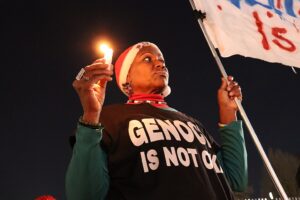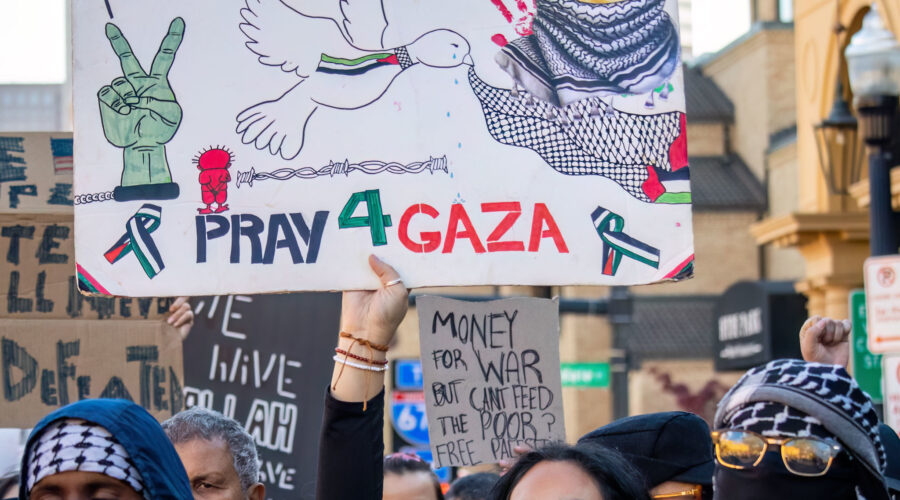The genocide we are all witnessing in Palestine is horrifying and devastating. Palestinians are being forced out of their homes and are injured and starving, and even though much of the mainstream media is calling this a war against Hamas, not Palestinians, this misrepresents the impact of the brutal conflict.
In the midst of this terror, food aid to Palestinians is reportedly being blocked, in a move that Al Jazeera describes as a “forced famine”.
The United Nations Relief and Works Agency for Palestine Refugees in the Near East (UNRWA) was founded 75 years ago to support Palestinian refugees, its work focused on distributing food aid and running educational and medical facilities. 150 UNRWA aid workers have been killed since the start of the war, and its staff are in grave danger, along with those they help.
But now more than a dozen countries, including the US, the UK, Canada, Germany and Australia, have suspended funding for UNRWA in the wake of accusations from the Israeli government that 12 of UNRWA’s 13,000 workers were involved in the October 7th attacks in Israel.
Those attacks, too, were horrifying and devastating.
UNRWA chief Philippe Lazzarini has called the suspension of funding an “additional collective punishment” and promptly dismissed the accused aid workers from their posts and began an investigation.
 Whatever the guilt – or not – of those 12 workers, UNRWA needs to continue its life-saving work at this critical time for Palestinians. Some other countries, like Ireland, Denmark and Belgium, have continued their funding of the organisation, with the Irish Tánaiste (deputy prime minister) saying “Israel has launched a disinformation campaign against Unrwa. Sufficient aid is still not reaching civilians in Gaza and that is clearly unacceptable”.
Whatever the guilt – or not – of those 12 workers, UNRWA needs to continue its life-saving work at this critical time for Palestinians. Some other countries, like Ireland, Denmark and Belgium, have continued their funding of the organisation, with the Irish Tánaiste (deputy prime minister) saying “Israel has launched a disinformation campaign against Unrwa. Sufficient aid is still not reaching civilians in Gaza and that is clearly unacceptable”.
He added that “if Unrwa was allowed to disappear it would be held by the Palestinian refugees as a betrayal by the international community, as an abandonment and ultimately impact their aspiration for self determination”.
The UK, one of the countries that is refusing to provide aid to UNRWA, is nonetheless happy to continue exporting arms to Israel, despite the government’s own criteria including that it should “not grant a licence if [the department] determines there is a clear risk that the items might be used to commit or facilitate a serious violation of international humanitarian law”.
Sacha Deshmukh, Amnesty International UK’s chief executive, told openDemocracy:
“The UK’s arms export system is based on the principle of avoiding a clear risk of British weapons being used to commit serious violations of international law. There’s mounting evidence that Israel’s military conduct in Gaza during the last week has included indiscriminate attacks which have killed and injured large numbers of Palestinian civilians.
“The government needs to follow its own rules and urgently suspend export licences for all arms transfers to Israel that risk being used to commit further unlawful attacks.”
Even if the 12 accused of UNRWA are guilty – and we so far have no independent decision on that – using that to punish the millions of Palestinians who have already lost everything is indefensible.
If we are “lucky”, we are watching the genocide on our screens. If we are terrifyingly unlucky, we are experiencing it firsthand. Many of us have people we love in immediate danger, and if the bombs were not enough, starving to death should not be an additional concern for those trying to flee the horror.
Allowing this humanitarian disaster to continue to unfold is unconscionable enough without preventing aid from getting to some of the most vulnerable people on earth because 0.09% of a UN agency’s staff are accused of immoral and violent acts.
Images: Paul and Elvert Barnes

